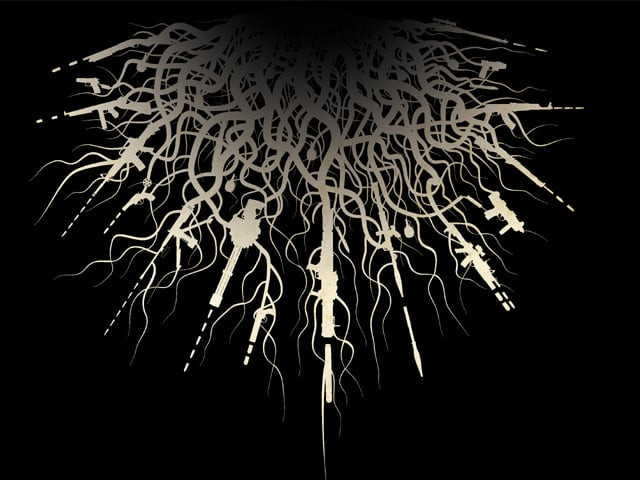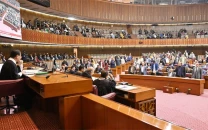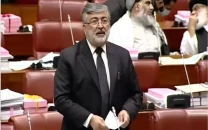Campus radicalisation: Secret group asks PU students to glorify Bin Laden in verse
Students and teachers suspect the competition to be the work of the IJT.

Campus radicalisation: Secret group asks PU students to glorify Bin Laden in verse
Two months after the covert US raid that killed Osama bin Laden, posters emblazoned with images of the burning World Trade Centre towers appeared at the country’s largest university advertising a literary contest to glorify the slain al Qaeda chief.
The poem and essay competition at Punjab University shows the footholds of hard-line Islamists on college campuses and growing efforts to raise their profile and influence even in the relatively cosmopolitan atmosphere of Lahore.
The contest’s organisers have kept their identities hidden. But many students and teachers suspect it is being held by the Islami Jamiat Talaba, a group that has increasingly enforced its conservative religious views on the rest of the campus – sometimes violently.
The IJT has denied involvement, saying it does not participate in secret activities. But its leaders have publicly acknowledged that many members support Bin Laden.
The ability of the IJT to gain ground on the university – even though many students reject its views – also reflects a general unwillingness of the authorities to challenge powerful Islamist forces.
“Whoever is America’s friend is a traitor!” roared the head of the student group, Zubair Safdar, in an interview with The Associated Press.
His views were echoed by 19-year-old student Bismah Khan as she read one of the posters promoting the Bin Laden contest. One of three topics for the essay section was: “Osama, a thorn piercing the hearts of infidels.”
The group holding the contest identifies itself only as “Sheikh Lovers” - a reference to bin Laden, who’s often called the “Sheikh” - and provided an email address for contestants to submit their entries by June 30. Attempts by the AP to contact organisers by email went unanswered, and it is unclear what kind of prizes would go to the winners.
Many students said they opposed the contest, reflecting the low support for Bin Laden, Al Qaeda and militant groups across the nation. “The killer of humanity cannot be a great person,” said student Ali Akbar.
A survey taken after bin Laden’s death by the Washington-based Pew Research Center showed that 12% of Pakistanis have a favourable view of al Qaeda. But only 10% approve of the US operation that killed him May 2 in Abbottabad. The raid humiliated Pakistan because the government was not told about it beforehand.
Expressing opinions freely can be dangerous business at Punjab University, which has an enrolment of roughly 30,000, because of the risk that IJT members will deem them against Islam, said students and teachers.
The group has effectively seized control of running the dormitories and sends groups of men across campus to enforce its strict brand of Islam: music is forbidden and men and women are not allowed to sit together outside class. It also discourages the formation of rival student groups.
“Their idols are people like Osama Bin Laden and Mullah Omar,” said Sajid Ali, the head of the university’s philosophy department.
One of these “Vice and Virtue” squads last week beat up a philosophy student who was sitting with a female classmate, said Safdar, head of the student group and university spokesman Khurram Shahzad. Teachers who cross the group also have allegedly been targeted.
“The university is not a date point,” said Safdar. “If boys and girls walk holding hands, sit together back to back or lay on the lawn, this is not Islamic culture,” he said.
Some of the philosophy students, mainly girls, staged a protest after the beating, shouting “Go Jamiat Go!” and “Shame Jamiat Shame!” But several members of the group appeared and pushed away the protesters.
Attempts by the administration to rein in the group have been stymied by the influence of its parent organisation, the Jamaat-e-Islami, teachers said.
One of the ways the student group increases support on campus is by targeting new students, many of them from rural areas, and giving them extra food in the cafeteria and special concessions for tea, juice and facilities such as laundry, students and teachers said. They also grant them positions within the group around campus, giving them a taste of leadership.
“They are very vulnerable,” said Naumana Amjad, an assistant psychology professor. “They are influenced quickly.”
Three former IJT members allegedly acted as hosts and facilitators for a Taliban suicide squad that attacked a mosque near army headquarters in Rawalpindi in 2009, killing 35 people, said intelligence officials, speaking on condition of anonymity because they were not authorised to talk to the media.
Hafiz Mohammad Iqbal, dean of the education faculty at Punjab University, said students were in danger of being radicalised because of the lackluster quality of education at public universities relative to private schools and the poor job prospects after graduation.
This environment can lead students in “the direction of radicalism and extremism,” he said.
Published in The Express Tribune, July 2nd, 2011.



















COMMENTS
Comments are moderated and generally will be posted if they are on-topic and not abusive.
For more information, please see our Comments FAQ